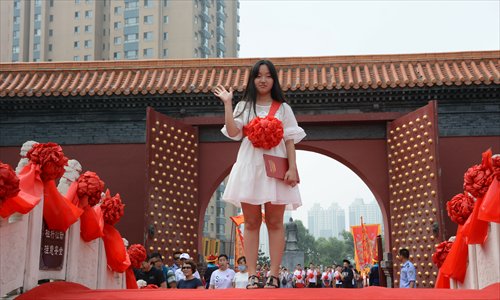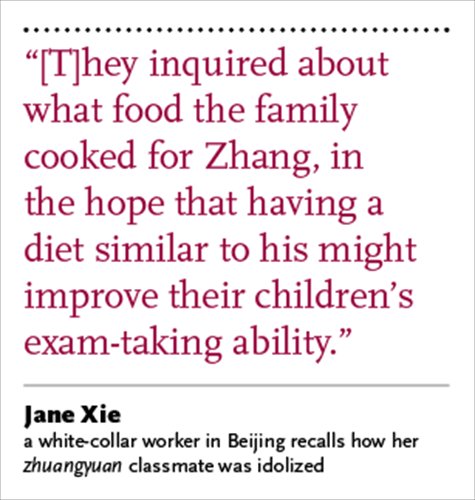China’s exam high-scorers weighed down by unrealistic expectations
Even in the Internet age, few ordinary people reach nationwide fame as quickly as those who ace the gaokao college entrance exams. While enjoying glory and admiration, these young people need to get ready for the sneers that will come if they fail to meet the sky-high expectations that society places on them.

The students who achieved the highest marks in their province on the gaokao's science section walk over the "bridge of zhuangyuan"in the Temple of Confucius, Jilin, Jilin Province on July 10, 2016. Photo: IC
Yuan Jiawei has been rather composed in front of the media, considering that just three weeks ago he had never been in the spotlight before. The young man has hit the headlines not for appearing on a reality TV show, becoming a viral sensation or causing controversy - he has become famous for acing his college entrance exam, or gaokao.
Yuan got the highest mark of any student in Hebei Province this year, making him a zhuangyuan. 9.4 million students took the exam this year, 423,000 of them in Hebei alone.
Just half an hour after the gaokao grades were released, he had already been contacted by two top universities and media reports started flowing immediately.
"I don't see it as something exciting. The grade is payback for my efforts in the past years, but also, it is a result of good luck," Yuan told the Global Times.
Beijing's prestigious Tsinghua University called first, inviting Yuan to a summer camp for its freshmen. Ten minutes later, the renowned Peking University called and offered him a place.
However, the early bird gets the worm and when, twenty minutes later at 1am, a Tsinghua teacher arrived at Yuan's home to collect him, they beat out their rivals.
The zhuangyuan (the highest-ranking students at the provincial, city or even county level) rise from obscurity to fame overnight. They become the focus of attention not only in their neighborhoods, media and society, but are also icons for their schools and top universities. Increasingly, businesses are looking to cash in on the zhuangyuan phenomenon.
As the news cycle turns, these gaokao gods are created one after another. They are not worshipped and then forgotten, however. Once a zhuangyuan, always a zhuangyuan. The expectations are there forever. If they ever fall short of people's sky-high expectations, the disapointment is just as loud as the praise they once faced.
"Then they are evaluated with another standard, based on their glory in gaokao, which is not fair," commented Xia Xueluan, a professor of sociology from Peking University.
The zhuangyuan effect
"There are golden houses in books," goes a Chinese old saying that encourages people to study hard, traditionally seen as the only road to success.
This saying came true for a young man named Wu Zhengtao in Enping, Guangdong Province. Wu thrilled the whole country recently by winning an apartment in his hometown for getting the highest marks on the gaokao in his city this year.
No doubt pleasing the real estate company which gave away the apartment, the media has eagerly reported this story and framed it as another example of the riches which good scores can win a person, adding yet another layer of shine onto zhuangyuan.
Besides receiving awards, zhuangyuan can turn their status into cash through their own initiative. Liu Mohan, a zhuangyuan in Changchun, Jilin Province, is making a small fortune selling her gaokao revision notes.
Even though the education ministry has been trying to downplay the influence of zhuangyuan, public adoration of this group is not decreasing at all. Instead, it is spurring a mini zhuangyuan industry.
Every year, products related to zhuangyuan, including their notes, zhuangyuan health products, electronic teaching aids that zhuangyuan apparently use and even the apartments that zhuangyuan previously rented, are all made available. Some temples even sell zhuangyuan charms and bracelets to ensure students get the good luck they need.
On taobao.com, one of the biggest shopping websites in China, notes on different subjects which sellers claim were written and used by zhuangyuan are among the best-selling study aids for high-school students. Tens of thousands of students buy such notes every year.
The economic value of zhuangyuan originates in the public's blind worship of high-scorers, which Xia argues is a remnant of the civil service examination system that was used in imperial China.
Jane Xie, a white-collar worker in Beijing, told the Global Times how one of her schoolmates surnamed Zhang was put on a pedestal by their community, after he became a provincial-level zhuangyuan about 10 years ago.
"After he became a zhuangyuan, everything related to him was special," said Xie. "The news just blew up our small county."
According to Xie, after the news of his status broke, many parents followed Zhang's grandmother when she was buying vegetables in the market. They bought whatever Zhang's family bought and they inquired about what food the family cooked for Zhang, in the hope that having a diet similar to his might improve their children's exam-taking ability.
Although Zhang was a somewhat scruffy boy who rarely washed his hair, almost all his female classmates' parents, including Xie's, encouraged their daughters to get to know him better.
The boy was the subject of discussion every time his father met with an acquaintance or friends. His father would be the center of attention, often giving monologues about how brilliant his son was, adding fabricated details to add to his portrayal of his son as a perfect student.
"They made his gaokao score the only standard for everything, and they deliberately deified him, making him a model for other students to follow," said Xie.
"There is nothing wrong with zhuangyuan, who just happen to get a high grade in gaokao through their efforts. But how society is exploiting them has deviated from the goal of education. It reflects a society of widespread fickleness," Xia told the Global Times.

A costly title
Many zhuangyuan across the country will share Zhang's experience of being showered with admiration and even jealousy. But this comes at a cost, as people say, the higher one is elevated, the more painful it is when one falls.
Xie said that Zhang's father still tries to brag about his son when someone asks about his career, but the shine has faded now that people know Zhang has an average job and an average salary. Students from his class who didn't get such a high gaokao score are now doing better than him in their careers.
"He is not doing poorly in a general sense, But people somehow feel disappointed. They thought he should have gone to study and work in a developed country like the US," Xie told the Global Times.
"They first took gaokao as the only standard to make a god, and then they abandoned him when he failed to achieve the success they expected, mostly in terms of fame and money," said Xie, adding that Zhang seldom contacts his classmates now.
Wang, who was the zhuangyuan of his Henan Province county in 2003, said that he still feels pressure about this when he meets his relatives.
After graduating from Tsinghua, Wang started his postgraduate studies in Zhejiang Province, a decision that shocked many of his friends and relatives who thought he would go abroad. Now he works in a research institute in Xi'an, Shaanxi Province and earns a wage he says is "not bad."
"My classmates don't ask me to my face, but my relatives question why I did not choose to be an official. That's what they expected from me since I became a zhuangyuan," Wang complained.
The expectations never dwindle. Every time a former zhuangyuan appears in a negative news story, it always arouses fierce discussion. Then the previous admiration changes into sneering derision, with many calling them "high score but low capability" and "sacrifices to the examination system."
Some have even researched the adult performance of zhuangyuan, and some point out that few zhuangyuan manage to live up to public expectations.
It has been reported that Luo Chongmin, former head of an education department in Yunnan Province, once surveyed 124 zhuangyuan from 1977 to 2009, and concluded that "none of them managed to become elite in their respective fields."
Another survey conducted by the Chinese University Alumni Association in 2015 goes on to point out that none of the over 3,000 zhuangyuan surveyed managed to get onto the Forbes or Hurun rich lists or become provincial- or ministeriallevel officials.

Hubei Province students who aced the gaokao's arts section ride horses in "zhuangyuan costume" while touring the district of Ancient Longzhong in Xiangyang, Hubei on July 9, 2015. Photo: CFP
Growing sensible
Whether they are sincere concerns or schadenfreude, Wang said such unfair expectations make him uncomfortable.
Wang explained to the Global Times that after leaving education he began to realize that in society, other factors like family background, social network, resources and interpersonal relations all matter in one's road to success.
"Unlike in the gaokao, where every one is equal to use what they learn at classes to get a score, society is much more complicated," noted Wang, "Besides, the definition of success is too narrow and too utilitarian in society."
"But it is not a bad thing that they fall short of people's expectations, which is beyond reproach. It will help prick the deified bubble of zhuangyuan and erase the halo, so that people can get more sensible about gaokao," noted Xia.
The situation is changing. More and more zhuangyuan are learning to ignore expectations and live a life they like. According to follow-up media reports, many zhuangyuan live ordinary lives as white-collar workers in China and face pressure like anyone does, "drifting in Beijing" or worrying about paying their mortgage.
"I never saw success as the goal of my life. The essence of life is happiness," Tu Hao, a zhuangyuan from Hefei, Anhui Province once told media.
Looking forward to his upcoming life on campus, Yuan told the Global Times that he does not plan to restrict his life with such expectations.
"It is natural that society has expectations, but it is equally natural if we fail to live up to it," said Yuan, "I will not care much about what others think about me. I will try to live my life my way."
Zhang Suozhan, a teacher at Yuan's high school, shared that as a teacher he expects students like Yuan will be successful in the future.
"But I will not use a single standard to measure them. They can be called excellent as long as they are doing their best in their fields," said Zhang.
Newspaper headline: Gaokao gods